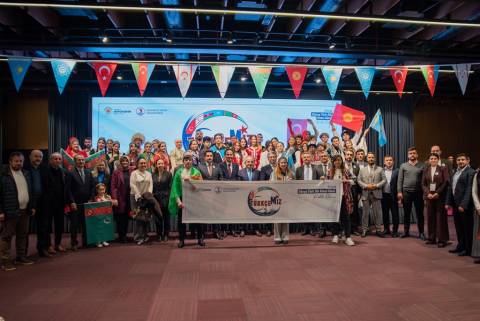Unity and Valor: Exploring the Historical, Political, and Literary Significance of the Çanakkale Victory
"Çanakkale is Impassable": The 109th Anniversary of the Çanakkale Victory
Marking its 109th anniversary, the Çanakkale Victory, which left a significant mark on both Turkish and world history as one of the largest and most challenging battles on land and sea, was commemorated at Ondokuz Mayıs University (OMU) through a panel discussion. This victory, which ignited the torch of the Turkish War of Independence by instilling courage, determination, and fighting spirit into the Anatolian people, is celebrated annually.
The event, titled "March 18th Çanakkale Victory: Its Historical, Political, and Poetic Aspects," held on the anniversary of the March 18th Martyrs' Day and the Çanakkale Naval Victory, featured Prof. Dr. Yavuz Bayram, an advisor to the rector from the Faculty of Education, Dr. Mehmet Aydın, and Prof. Dr. Önder Duman from the Faculty of Humanities and Social Sciences as panelists.
The panel, organized at the Atatürk Congress and Culture Center (AKM), was attended by Vice Rectors Prof. Dr. Sevim Alışır and Prof. Dr. Selim Eren, University Secretary-General Prof. Dr. İdris Varıcı, Rector Advisors Prof. Dr. Nalan Kızıltan and Assoc. Prof. Dr. Şener Şentürk, Deans of various faculties including the Veterinary Faculty, Agriculture Faculty, Education Faculty, Science Faculty, Theology Faculty, Director of the Women and Family Studies Application and Research Center (OMÜKAM) Prof. Dr. Mucize Ünlü, deputy secretaries-general, academics, administrative staff, and numerous students.
Prof. Dr. Duman: "The Allied Powers Suffered Significant Losses and a Severe Blow to Their Reputation"
Prof. Dr. Önder Duman, who first spoke to evaluate the historical process and progression of the Çanakkale Battle, stated, "The March 18th Çanakkale Victory, which began with a naval battle and continued with a land battle lasting about 16 months, is inscribed in our history in golden letters. Prior to the Çanakkale Victory, the Ottoman Empire had made significant gains on the Sarıkamış and Canal Fronts. Faced with this, the Allied Powers initiated an attack on the Çanakkale Straits on February 19, 1915, aiming to knock the Ottomans out of the war and to assist Russia. However, their attacks failed, and they were forced to retreat. Subsequently, on March 18th, the Allied Powers launched their most formidable operation with numerous naval forces. Yet, due to the mines laid by the Nusret Mine Ship and the artillery batteries a day before this date, the Allied Powers suffered significant losses and a severe blow to their reputation."
"Colonel Mustafa Kemal Achieved Significant Successes at Anafartalar and Conkbayırı"
On the 109th anniversary of this great naval victory achieved on March 18, 1915, which we gathered to commemorate both our martyrs and this victory, Prof. Dr. Önder Duman continued, "When it was understood that the naval operation could not reach Istanbul, the Allied Powers initiated a bloody and prolonged war with a land operation on April 25, attempting to seize the Ottoman coastal artillery batteries at the Çanakkale Strait. Mistakes by the 5th Army Commander, German General Otto Liman von Sanders, led to significant losses for the Ottomans. Furthermore, the landing of ANZAC units prompted long-lasting trench warfare. Later, a third landing was made at Arıburnu on August 6, 1915, with new forces to reinforce the forces on the coast. However, on August 9, Colonel Mustafa Kemal, changing the course of the war, succeeded in pushing the British Command's Reserve Division out of the front line during the First Battle of Anafartalar. Mustafa Kemal launched a new counterattack on the Conkbayırı line the next day, successfully repelling the ANZAC forces there. Following these developments, the Allied Powers evacuated the Gallipoli Peninsula in December 1915."
Prof. Dr. Önder Duman concluded his speech by stating that with the minimum conditions provided for the army, there could be no battle that the Turkish nation couldn't win, and he finished his speech by addressing some common misconceptions about the Çanakkale Battle.
Dr. Aydın: "The Çanakkale Battles Are Among the Most Noteworthy Engagements of World War I"
Dr. Mehmet Aydın, focusing on the political, military, and economic consequences of the Çanakkale Battle, stated, "Historical events are interconnected through cause and effect relationships. The Çanakkale Battles are among the most noteworthy engagements of World War I and represent the only front where the Ottoman armies achieved a decisive victory. This victory did not yield favorable results for the Allied Powers because they aimed to eliminate the Ottoman Empire from the war and reach Russia, expecting to quickly end the war with the grain support they would obtain. However, they failed to achieve their goals. In Russia, the management style changed with the revolution. Bulgaria joined the Central Powers after this victory. Thus, the Çanakkale Victory revised military balances and extended the war by two years."
"Mustafa Kemal Pasha's Successes in the Çanakkale Victory Had Significant Effects on His Emergence as a Leader of the National Struggle"
Emphasizing that the Çanakkale Battle also changed the balances in the Middle East, Dr. Instructor Member Aydın stated, "When we consider the process leading to the establishment of the State of Israel, a Jewish battalion of 600 joined the British in the Çanakkale Battles. A declaration published by the British later opened the way for establishing a state for the Jews in the lands of Palestine. Besides its economic impacts, the Çanakkale Victory would significantly affect the initiation of our struggle in the War of Independence and the formation of spiritual strength. The resurgence of confidence in the Turkish nation and the impact of Mustafa Kemal Pasha's successes in the Çanakkale Victory on his emergence as a leader in the National Struggle were significant."
Another panelist, Prof. Dr. Yavuz Bayram, analyzed the reflection of the March 18th Çanakkale Victory in poetry and literature, specifically through the works of Mehmet Akif Ersoy, "To the Martyrs of Çanakkale" and "The National Anthem."
Prof. Dr. Bayram also mentioned a competition related to the Çanakkale Battles, stating, "A competition was organized to crown the Çanakkale Victory, aiming for texts to make the victory known among the people. For this purpose, a committee of writers and poets was formed. These individuals were taken to the front to see the kind of struggle and heroism displayed by the soldiers, so they could write about this heroism and let the people know. Unfortunately, this committee could not achieve the desired result."
Prof. Dr. Bayram: "We Consider Both Poems as 'Eternal and Literary Declarations of Victory'"
Highlighting Çanakkale's role as a source of motivation for the National Struggle from historical and literary perspectives, Prof. Dr. Bayram continued:
"The poem 'To the Martyrs of Çanakkale' is actually a national anthem written by Mehmet Akif Ersoy. Why do I say this? For once, the spirit of Çanakkale and the spirit of the National Struggle during the War of Independence are the same. Both poems are written with the same emotional state. The first, 'To the Martyrs of Çanakkale,' is a poem written after a victory, honoring and crowning it. But the National Anthem heralds and calls for a victory. The poem that best describes Çanakkale, unquestionably and without a rival, is 'To the Martyrs of Çanakkale.' Similarly, the poem that best describes the National Struggle, again unquestionably and without a rival, is the National Anthem, a text that 'encourages' our soldiers. They tried to find a rival, but they could not. Some are disturbed by the messages it conveys and attempt to find an alternative to the National Anthem. However, they cannot even find an alternative. Therefore, we consider both poems as 'Eternal and Literary Declarations of Victory.' Both texts aim to form a front against the imperialist Western world. Even after more than a century, we commemorate these texts in our ceremonies, talk about and evaluate them, benefit from them, and hold congresses and symposiums about them. At the same time, the poem 'To the Martyrs of Çanakkale' is an 'appreciation.' That is, it is a text that appreciates the heroes and martyrs of Çanakkale. 'To the Martyrs of Çanakkale' was written during the last periods of the Ottoman Empire, and the National Anthem was written in a period that could be considered the beginning of the Republic, a herald of the Republic. When 'To the Martyrs of Çanakkale' was written, the Committee of Union and Progress was in power; when the National Anthem was written, there was the government of the Grand National Assembly of Türkiye. As you know, we lost a young and enlightened generation during the periods these texts were written. Moreover, there is no 'separation' between these two poems but 'completeness', meaning there is more 'unity' than 'difference.' They do not diverge from each other but complement each other. There are significant similarities in language and style between the two texts."
"The National Anthem is a Distilled Form of the Poem 'To the Martyrs of Çanakkale'"
In the final part of his speech, analyzing the works "To the Martyrs of Çanakkale" and "The National Anthem" in terms of the messages they convey, Prof. Dr. Yavuz Bayram stated, "The messages given in both are common. Mehmet Akif delivers the same message using different words, sentences, and arrangements. We could also consider the poem 'To the Martyrs of Çanakkale' as the first national anthem written by Akif. The National Anthem is, therefore, a distilled form of the 'To the Martyrs of Çanakkale' poem."
At the end of the program, Vice Rector Prof. Dr. Sevim Alışır presented certificates of appreciation to the panelist academics for their participation and contributions.



















